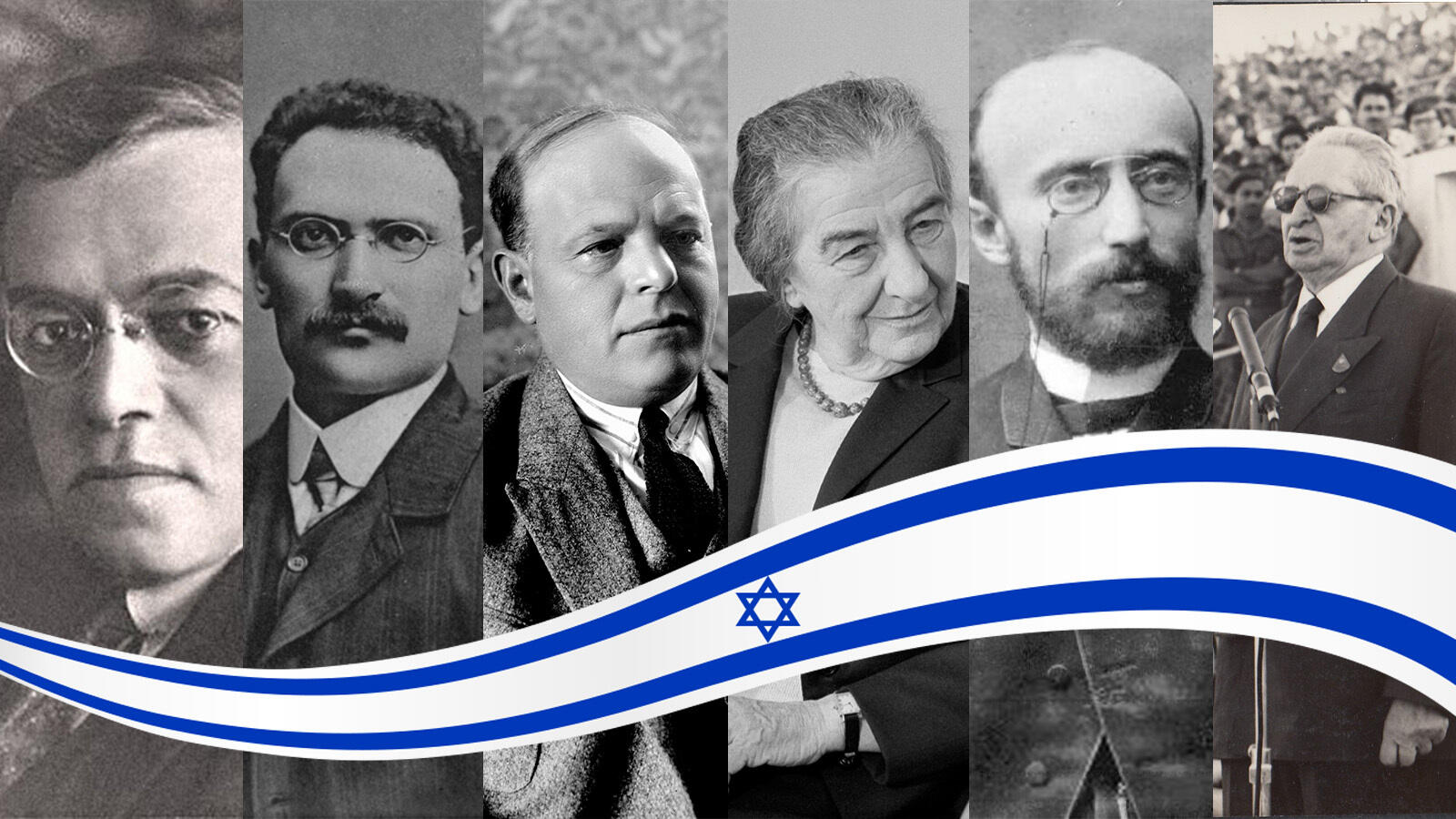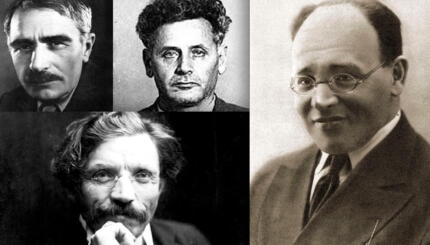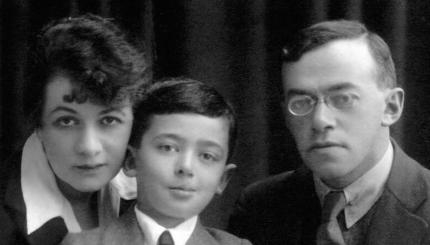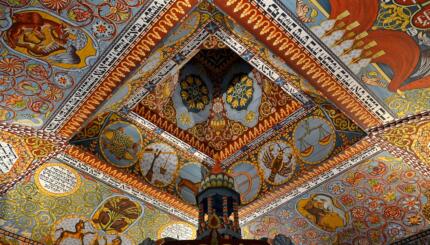It would be hard to argue that any single country played the greatest role in the early history of the Zionist movement, but there is a case to be made that Ukraine deserves that title. First, it produced a very large number of important Zionists. Among the small handful of men who, in the early 1880s, founded the Hibbat Zion (Love of Zion) movement to settle Jews in the land of Israel — the precursor to the Zionist movement Theodor Herzl founded at the end of the century — there were two Ukrainian Jews. A little later Ber Borochov, who was born in a small Ukrainian town and died in Kiev, would create the synthesis of Marxism and Zionism that became the ideology of Israel’s Labor party. Vladimir Jabotinsky, who played a parallel role for the Likud party, was born and raised in Odessa. Ahad Ha’am, considered the founder of “cultural Zionism,” was born and lived most of his life in Ukraine. Three of Israel’s early prime ministers were born in Ukraine, as were two of its presidents.
The same is true for literature: Hayim Nahman Bialik, Zionism’s great poet, and Shmuel Yosef Agnon, the greatest modern Hebrew novelist, were both born in Ukraine, as were several other comparable figures. And that’s not to mention contemporary Israeli leaders like Minister of Jerusalem Affairs Zev Elkin, or the former politician and refusenik leader Natan Sharansky.
Read: Sixteen Jews from Ukraine who changed the world.
With your help, My Jewish Learning can provide endless opportunities for learning, connection and discovery.
Why Ukraine?
Individual stories don’t tell us everything. The story of Zionism itself begins in Ukraine in the 1880s. At the time, the territory that now comprises Ukraine was divided into two very different spheres. One was an area of about nine Russian provinces, all of which were located in the “Pale of Settlement,” that is, the area in which Russian Jews were legally allowed to live without special permission. The remainder lay in the Austro-Hungarian empire. Taken together, these territories were then home to well over a million Jews. That is, a sizable portion of the world’s Jewish population lived in Ukraine, and a sizable portion of Ukrainians were Jewish.
In the 1860s and 70s, Tsar Alexander II had been trying to catch his country up to the 19th century, which meant ending serfdom, creating quasi-democratic local governments, and introducing a European-style legal system. For the Jews, it meant gradually loosening discriminatory legislation, such as restrictions on where they could live. Thus Jews still needed special permission to live in Kiev (Kyiv), but it became a lot easier to get it. New economic opportunities were also opening up, even as old ones were closing. As it happened, a lot of those new opportunities were in Ukraine, while other areas of the Pale saw more economic decline.
All that changed in 1881, when a gang of terrorists assassinated the tsar. In doing so, they hoped to inspire the oppressed masses of Russia to rise up against the government and the aristocracy, and issue in a new era of freedom and prosperity. That didn’t happen, but people did rise up and attack the Jews. For the next two years, a wave of bloody pogroms swept through the Pale and even beyond, most of which occurred in Ukraine. Rather than turn a blind eye to the violence, the new tsar responded — by creating harsher laws about where Jews could live and how they could make a living.
For proponents of the Haskalah (Jewish Enlightenment) who hoped for a future where their brethren acquired more rights while adjusting to Russian society, both the pogroms and the government’s reaction came as a crushing blow, and made them reconsider the future of Jews in Russia. This intellectual reaction was felt particularly in Odessa — a city absolutely central to the history of Zionism.
The Magic of Odessa
Odessa was founded on territory that Catherine the Great had seized from the Ottoman empire in 1792. Unlike such cities as Vilna or Lviv or the hundreds of shtetls where Jews had lived for centuries, Odessa was brand new, and one of very few Russian cities where Jews could freely settle and seek new economic opportunities. Compared to their brethren elsewhere in Russia, Jews in Odessa were less religiously observant and more likely to speak Russian instead of, or in addition to, Yiddish. This bustling port city was the place to go if you were seeking wealth; or if you wanted to get away from your family, close-knit shtetl life, or religious observance altogether; or if you were an aspiring intellectual eager to take part in the Haskalah.
It was Odessa’s promise of the new, combined with its proximity to the old world of the shtetl, that made it such a vibrant place for Jewish cultural and intellectual life from the 1860s until the Russian Revolution. The city drew Jews from outside of Ukraine as well, and for two or three decades it was the center of the Haskalah.
The Early Zionists of Odessa
Among the many young Jewish men who came to Odessa eager to explore new ideas and to leave a mark on Jewish life with their pens was Moshe Leib Lilienblum. He soon became a central figure of Jewish intellectual life in the city, and was the archetypal figure who moved from embracing the Haskalah to embracing Zionism. There were other individuals who played a greater organizational role in the Zionist movement of the 1880s, but it was Lilienblum who was the foremost thinker, who imagined not just settlement in the Jewish homeland, but a revival of Hebrew and a renaissance of the Jewish nation and of the Jewish soul.
In 1889, early Zionism’s next great moment came in Odessa as well, when the Ukrainian-born Asher Ginsberg — known by the pen name Ahad Ha’am — became the leader of a secret society called the Bnei Moshe, which tried to coordinate efforts to bring Jews to the Land of Israel. Under his leadership, Odessa remained the international nerve-center of Zionism until Theodor Herzl convened the First Zionist Congress in 1897, and Herzl’s newer movement subsumed the older Russian one. But during the two decades thereafter, Odessa did not cease to be the beating heart of Zionist thought and culture.
This was just the beginning of a much longer story. Odessa would create other great Zionist leaders. Vladimir Jabotinsky, founder of Revisionist Zionism, was an archetypal Odessan, with one foot in the Russian world and one foot in the Jewish one, and he wrote with exuberance about his love for his native city. There were also a few other large Ukrainian cities, like Kharkov, whose Jewish histories weren’t so unlike Odessa’s. That may be part of the reason Kiev gave us Golda Meir, and Donetsk gave us Natan Sharansky.
Later Generations
A lot more could be said about Ukrainian Zioinists and Zionism, but instead I’d like to fast forward to a man who, in 2022, became the world’s most famous Ukrainian Jew when Russia invaded that country: Volodymyr Zelensky. The comedian-turned-Ukrainian-president certainly has strong ties to Israel, yet he committed his life not to the Jewish nation, but to the Ukrainian one. In the early months of the war, he irked a fair number of Israelis, and American Zionists, with his complaints that the Jewish state hadn’t done more to help his country, not to mention with his comparison of the bloody Russian invasion to the Holocaust. So he seems an odd choice to speak about in the context of Ukrainian Zionism.
But not so odd. Many if not most Zionist thinkers believed that Jews should be devoted and patriotic citizens of the countries in which they lived, until the time came when they would make their way to the land of Israel. In the 1920s and 30s, scores of young Zionists joined the Polish army to show that they could be full-fledged citizens, to combat myths about Jewish cowardice and unmanliness, and because they saw a commonality between Poland’s recent struggle for independence and the Jewish one.
In the 21st century, Zelensky has been admired the world over for his courage and determination; he is proudly Jewish, proudly pro-Israel, and proudly Ukrainian; he is also a fighter for freedom and national self-determination. In that way, he fulfills a certain kind of Zionist ideal. No doubt Ukrainian Zionists of a century ago would have seen him as a hero, perhaps Jabotinsky most of all.
Want to learn more about the Jews of Ukraine, past and present? Sign up for My Jewish Learning and JTA News’ email series to learn more about the complicated Jewish history of Ukraine and how the past sheds light on the battles unfolding today.



